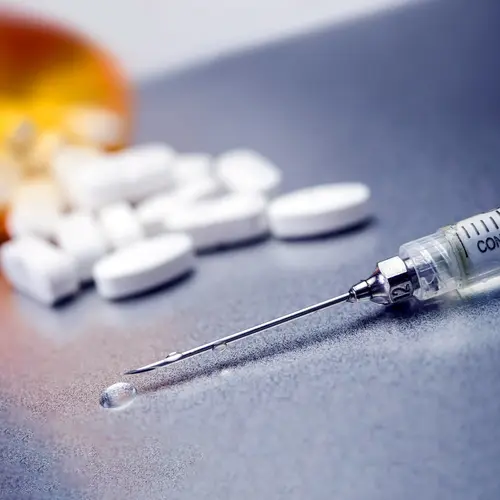Ovarian hyperstimulation syndrome (OHSS) is a condition caused when the ovaries adversely react to an abundance of hormones. The ovaries become swollen and painful and possibly leak fluid.
OHSS typically develops in women undergoing in vitro fertilization (IVF) with injectable medications. Medications taken by mouth don’t usually lead to OHSS. It is not a long-term condition if treated quickly.
Causes of Ovarian Hyperstimulation Syndrome
OHSS is caused by a pregnancy hormone called human chorionic gonadotropin (HCG). HCG is created by the cells that form the placenta around a developing embryo and can be detected as early as one week after your egg is fertilized.
OHSS occurs when you have higher levels of HCG. High levels rarely happen naturally. Fertility treatments, especially those that involve injections of HCG, can overstimulate your ovaries. When HCG is introduced to your system, your ovaries may react abnormally by swelling and leaking fluid, leading to OHSS.
Symptoms of Ovarian Hyperstimulation Syndrome
The swollen and leaking ovaries caused by OHSS can lead to several symptoms. The types of symptoms determine the severity of your OHSS. Some of the mild symptoms are:
- Weight gain
- Bloating in your abdomen
- Abdominal pain
- Vomiting
- Diarrhea
- Nausea
- Tenderness around your ovaries
Complications can lead to severe symptoms, such as:
- Excessive or rapid weight gain
- Difficult breathing
- Decreased urination
- Blood clots
If you experience any of these symptoms, contact your doctor. You can avoid complications with OHSS if you treat it early.
Diagnosing Ovarian Hyperstimulation Syndrome
If you are receiving fertility treatment and begin to experience symptoms of OHSS, tell your doctor. They may perform some of the following exams to diagnose the condition.
Physical exam. A physical exam can indicate weight gain and bloating. Weighing yourself every day will determine how quickly you gain weight and can make a diagnosis easier. Your doctor will likely measure your belly for any signs of severe bloating.
Ultrasounds and X-rays. Electronic imaging, like ultrasounds and X-rays, will locate fluid elsewhere in the body. OHSS becomes severe when fluid begins leaking into the abdomen and torso. Leakage leads to bloating and weight gain.
Ultrasounds will also reveal how much the ovaries have swollen. The size of the ovaries is often a sign of how severe your OHSS is.
Blood tests. Blood tests are regularly performed along with ultrasounds for patients undergoing fertility treatment. Blood tests measure hormone levels, abnormalities in your blood, and if your kidneys are being affected by the swollen, leaking ovaries. If it’s part of your regular treatment, you will likely catch OHSS early before it becomes severe.
Treatment Options
The type of treatment you receive depends on the severity of your OHSS.
Mild OHSS. Mild cases will generally clear up on their own in around two weeks. Any treatment for mild OHSS is focused on relieving discomfort and avoiding complications.
The following treatment options will help ease the discomfort you’re experiencing from OHSS:
- Increase fluid intake (1.5 to 2 liters)
- Get plenty of rest with light activity as recommended by your doctor
- Take over-the-counter pain relievers
- Weigh yourself daily to monitor drastic changes in body weight
- Avoid caffeine and alcohol
Unless the symptoms worsen, major treatments or hospitalization usually aren’t needed.
Severe OHSS. Severe cases may require hospitalization and significant treatments. Treating OHSS early can prevent major complications. Treatments for severe OHSS may include intravenous (IV) fluids, medication to relieve symptoms, and medication to reduce ovarian activity.
If you’ve had significant leakage into your abdomen, manual drainage with a syringe can provide relief.
Preventing Ovarian Hyperstimulation Syndrome
If you’re undergoing fertility treatments, having a plan tailored to you will keep your hormone levels stable. These treatments include:
- Adjusting your medications so you receive the lowest dosage of HCG
- Adding a variety of medications that reduce the swelling and irritation of your ovaries
- Ceasing injectable medications for a few days to allow your hormones to level out
- Avoiding HCG injections altogether and opting for an alternative
For those undergoing IVF, your doctor may recommend removing and freezing the mature follicles. This will give your ovaries the chance to rest until your body is ready to continue IVF.
Risks and Complications
Complications with OHSS can be severe and sometimes fatal. Leaking fluid can cause extra pressure in your abdomen and dehydration. This pressure can lead to blood clots in the legs or lungs, which can be life-threatening. Be mindful and seek early intervention to prevent complications.
When to Contact Your Doctor
When you begin experiencing the following symptoms, contact your doctor:
- Difficulty breathing
- Severe abdominal pain
- Inability to keep down food or liquids
- Weight gain of more than 2 pounds a day
- Lightheadedness or dizziness
- Infrequent urination

